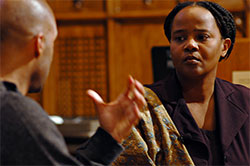Talking with a Tale-Spinner
On Monday, November 7, noted Haitian-American author and Columbia alumna Edwige Danticat was the subject of CITIZEN, a public discussion in talk-show format run by TC's Film and Education Research Academy and hosted by doctoral student Kelvin Sealey.
While CITIZEN discussions are usually marked by frequent references to popular films, including the use of film clips to bolster discussion, this talk, titled "Authorship and Social Crisis," focused on Haiti's history through the lens of Danticat's writing.
"I grew up in a family that experienced history very personally and talked about it as though it happened yesterday," Danticat said. "The Haitian revolution was the first successful slave revolt in history, it created the first black republic -- so for us, the past was always present."
Danticat was born in Haiti, and by the time she was four years old, both of her parents had immigrated to America, leaving her in the care of her aunt and uncle. She spent the next eight years in French-language schools in Haiti, and when she rejoined her family at age 12 in Brooklyn, her accent and upbringing made her feel like an outcast. She took solace in literature and writing, and began publishing English-language pieces while still a teen-ager.
She tried a number of different paths in college, but her love of writing, spurred by "a desire to tell the story to myself most of all," won out. She earned a bachelor's degree in French literature from Barnard and a master's in fine arts from Brown University. Her master's thesis was later published as her first novel, Breath, Eyes, Memory.
Since then, Danticat has published such acclaimed works as the novel The Farming of the Bones, and Krik? Krak!, a collection of short stories. She maintains close ties to Haiti and continues to draw literary inspiration from her family's own experience with Haiti's political turmoil. "There are so many moments like that in writing, where it feels like fiction or self-indulgence, and then it becomes real," she said.
Although many people see Danticat as a voice for Haiti's dispossessed, she resists being cast as a public icon. "Authors have a different sort of connection -' there's a kind of intimacy," she said. "People have said -'I've never heard of Haiti but I read this book and I feel close to it,' and that's a wonderful thing."
Published Wednesday, Dec. 21, 2005
